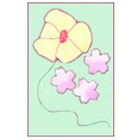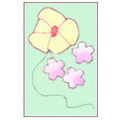My mother has a circle metaphor. I don’t think the metaphor is originally hers and when I ask her where she got it from, she doesn’t remember. “That’s not the point,” she tells me when I ask her about the origins of her circle metaphor. The point, she explains, is that the metaphor for a human being becoming a circle makes sense and is a good thing.
I tend to overanalyze and overdramatize things, but when she puts it that way I get it. To be a circle makes sense. It’s a logical metaphor. Circles are good. Round shaped things are preferred. We get in groups of circles to have discussions with people. I like to round the edges on furniture and other sundry items. Wheels are perfectly circular shaped and therefore allow transportation devices to move. We make U-turns (a half circle) and turn corners.
I generally associate “good” with circle, and “bad” with square. I don’t know if this is a conditioned notion that was instilled in me from a young age or if it’s natural instinct. Squares have sharp and rigid edges. It’s painful when I bump my leg against the edge of a square table. I’ll usually end up hating that table and every time I see that table, it will remind me of the pain in my leg. Being a square also implies that someone is boring and unadventurous. My friends tell me not to be such a “square” when I refuse to go to a club or dance if I do go. The shape of a square conjures rigidity and negative feelings (as opposed to the circle which suggests calmness), especially if one was injured by a sharp-edged square-shaped table. We’re told from when we’re small to be well-rounded individuals when we grow up. “Rounded” in well-rounded implies versatility and interest in a variety of things; to be in both good mental and physical health. And circle just sounds better than square.
On a deeper level — and I think this is where my mom is coming from — for a person to be a circle means that he or she can listen to others without judging them. A “circular” person is someone who can gracefully share his or her opinions with those that disagree, and be a naturally open-minded person. Clearly, I am not a circle. If I were, my mother wouldn’t tell me to be one.
I remember being fascinated with the circle in my trigonometry class in high school. My math teacher was very passionate about math. He was especially excited when it came time for the lesson plan on circles. “The circle is fascinating,” I remember him saying with a gleam in his eyes. It was all he could say. The sparkle in his eyes and the momentary silence that filled the classroom was enough for me to understand that my teacher’s fascination with the circle was somewhat divine. There were no other words for him to describe the wonderment he felt for the circle.
Until taking trigonometry with this math teacher, I absolutely despised math. Math and I didn’t get along. My trig teacher was the first teacher I witnessed that had an unexplainably rare, true passion for a subject. He wouldn’t let me out of class until I grasped the concept. It was painful for me to stay after class and drill myself with math problems that combined algebra, geometry and formulas I had to memorize. It was like growing teeth. I’d cry my way through it until I understood what I was doing. But when I got it, when I understood why and how I solved one math problem, I remember feeling like my life expanded — cyclically. I was rounding my edges.
The definition of circle in the Merriam-Webster dictionary is: “a closed curve every point of which is equally distant from a fixed point within it.”
From a mathematical point of view, the circle is a perfectly shaped shape that, I’ve heard from physicists in documentaries and my trig teacher, can explain the universe. If a circle — something so simple, and of course profound — can explain the universe, it must be able to explain the human being. Maybe this is where my mom comes in.
From a spiritual standpoint, the circle draws forth only positive feelings in me. In my yoga class, the teacher tells us to find our “center.” When I’m fully concentrated and sitting in the proper yoga position, I do feel centered and it’s a good feeling. My body, both physically and spiritually, feels balanced. There is no one particular area that feels heavier than another.
When I overanalyze the circle metaphor, I wonder why my mother would tell me to be a metaphor rather than giving me specific rules like, “Don’t eat after 10pm,” and “Don’t sleep with your hair wet.” To be a circle suggests so much more. It’s an all-encompassing rule for all rules that you know you should be following without anyone having to tell you. I’d probably complain if I were given specific rules to do this and not that.
A simple metaphorical rule like, “Be a circle,” undeniably says it all. People with circular wisdom would say that. Others probably wouldn’t, expecting to be given rules that they’d break for being given rules in the first place. It’s a never-ending cycle. I’ll just leave it at that.
© 2006 Victoria Kraus




